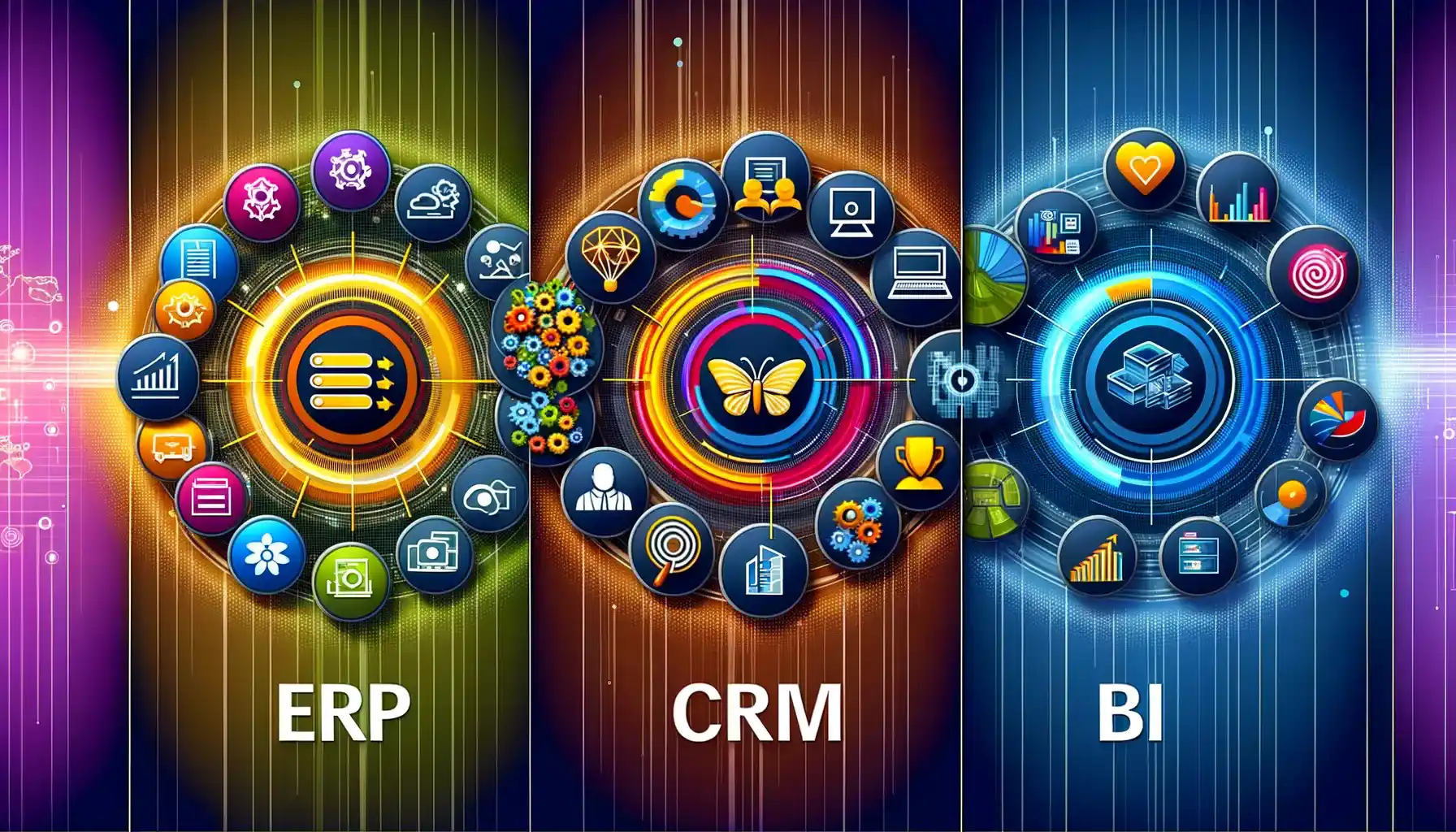Table of Contents
In today’s digital age, businesses rely heavily on enterprise software to streamline operations, enhance productivity, and drive growth. From customer relationship management (CRM) to enterprise resource planning (ERP) and beyond, the landscape of enterprise software is vast and ever-evolving. This article aims to provide an in-depth exploration of 11 powerful enterprise software types, shedding light on their features, benefits, and applications in modern business environments.

11 Enterprise Software Types
As you navigate the complexities of managing an enterprise company or leading a team within one, optimizing processes becomes paramount for efficiency and success. Leveraging the right enterprise software can significantly streamline operations and enhance productivity.
Below, we outline 11 crucial types of enterprise software to consider for 2024 empowering you to search for ideal tools tailored to your business needs.
1. Enterprise Resource Planning (ERP) Software
Enterprise Software types encompass various solutions designed to streamline organizational operations. Oracle ERP Cloud delivers a comprehensive suite of cloud-based tools, catering to businesses of all sizes with modules spanning finance, procurement, and supply chain management. SAP S/4HANA employs in-memory computing for real-time insights, optimizing finance and logistics functions.
Microsoft Dynamics 365 offers a flexible ERP platform integrating seamlessly with Microsoft tools, enhancing growth and customer experiences. Collaborating with a Dynamics 365 partner can further help organizations customize and implement tailored solutions that maximize the platform’s capabilities. Tailored for small to midsize businesses, Sage Intacct’s cloud ERP solutions feature robust financial management and automated processes, empowering informed decision-making. These diverse offerings epitomize the evolution and versatility of enterprise software types.
2. Customer Relationship Management (CRM)
Enterprise software types encompass various solutions, among which Customer Relationship Management (CRM) software is pivotal. Specifically tailored for sales and marketing teams, CRM systems streamline lead management, deal tracking, and client relations. They ensure cohesive communication and optimize sales strategies. Leading CRM solutions include Salesforce, renowned for its extensive features and scalability, encompassing modules like Sales Cloud, Marketing Cloud, and Service Cloud.
HubSpot CRM is favored by small to midsize businesses, boasting a user-friendly interface and robust tools for contact management, deal tracking, and marketing campaigns. Keap, previously Infusionsoft, targets small enterprises and entrepreneurs with its CRM and marketing automation features, facilitating lead capture, email marketing, and e-commerce integration for comprehensive customer engagement.
3. Business Intelligence (BI)
Enterprise Software types like Business Intelligence (BI) tools are indispensable for data-driven decision-making. Datapine offers scalable solutions with intuitive dashboards and predictive analytics. Domo provides cloud-based BI with real-time insights and mobile accessibility. Sisense stands out for its scalability and agility, offering advanced analytics and embedded capabilities.
These platforms empower organizations of all sizes to aggregate data, predict trends, and reduce costs. With drag-and-drop features and machine learning capabilities, they facilitate seamless integration into existing workflows, enabling enterprises to derive actionable insights from complex datasets, thus optimizing business performance and strategy.

4. Human Resource Management (HRM)
Human Resource Management (HRM) software is vital in enterprise software types, automating HR processes. HRM software aids in recruitment, payroll, and workforce management amid diverse workforces. Recruitment and Applicant Tracking Systems (ATS) streamline hiring, centralizing candidate data.
Examples include Paycor, with comprehensive recruitment tools, and Workday, known for unified HR platforms. Freshteam offers intuitive recruitment workflows. Payroll and Benefits Administration Software simplifies payroll processes, ensuring compliance. Paycor and Workday provide robust payroll solutions.
Training and Development Platforms nurture employee skills. Monday.com offers training management features, while Workday’s Learning module supports personalized learning paths. Overall, HRM software types optimize HR operations in enterprises, enhancing efficiency and compliance.
5. Supply Chain Management (SCM)
Supply Chain Management (SCM) software streamlines operations from raw material to customer delivery. It optimizes procurement, inventory, and distribution, enhancing efficiency and satisfaction. Blue Yonder, formerly JDA Software, integrates AI for improved decision-making. Infor’s suite aids demand planning and logistics for market adaptability.
Epicor’s scalable solutions suit manufacturers and distributors, focusing on inventory and order control. Logility’s advanced software enables demand forecasting and supply chain analytics, enhancing visibility and responsiveness. These top SCM solutions offer comprehensive tools for enterprises, ensuring smooth flow and optimization throughout the supply chain process.
6. Marketing Automation
Enterprise software types encompass various specialized tools, including marketing automation software, streamlining repetitive marketing tasks within Customer Relationship Management (CRM) and Marketing Software. Marketo stands out with its tailored automation features, ideal for enterprise-level needs like lead management and analytics.
HubSpot boasts a user-friendly interface, offering email marketing, social media management, and comprehensive analytics. Drip targets e-commerce with personalized messaging and automation workflows, optimizing online sales. Keap, suited for small to medium-sized enterprises, facilitates lead generation, email marketing, and CRM with customizable workflows and integrations. These platforms empower marketing teams to focus on strategic planning and creative endeavors.

7. Business Process Management (BPM) Software
Enterprise Software types such as Business Process Management (BPM) software are crucial for optimizing and monitoring repetitive business processes to boost efficiency and agility. Seamlessly integrating with various enterprise tools, BPM software streamlines operations across departments.
Leading BPM Software:
- BPMApp: Renowned for its intuitive interface and robust process modeling, BPMApp offers advanced automation and seamless integration with enterprise tools.
- Kissflow: Known for its user-friendly interface and pre-built process templates, Kissflow facilitates workflow automation without extensive coding.
- Jira: Beyond project management, Jira’s customizable workflows and automation rules make it versatile for BPM.
- Nintex: With powerful workflow automation, Nintex handles complex processes and integrates with enterprise systems effectively.
8. Knowledge Management
Enterprise software types, like knowledge management software, fall under the ECM category, organizing, storing, and sharing vital knowledge within organizations. Guru, a leading platform, centralizes knowledge with AI-powered suggestions and integrations. Helpjuice streamlines sharing with customizable templates and robust search.
Confluence by Atlassian fosters collaboration through document creation and version control. Document360 specializes in technical documentation and self-service support with intuitive tools and analytics. These platforms enhance internal processes and customer support by providing quick access to relevant information, enabling efficient knowledge sharing and collaboration within enterprises.
9. Content Management System (CMS)
Enterprise software types like Content Management System (CMS) streamline website and blog management, eliminating the need for extensive coding. They facilitate content creation, editing, and publishing, enhancing digital presence and content marketing efforts. Top CMS software includes WordPress, renowned for its user-friendly interface and extensive plugin ecosystem, catering to businesses of all sizes.
Shopify, primarily an e-commerce platform, offers robust CMS capabilities for online store management. Partnering with a trusted Shopify development company can further enhance the platform’s potential, providing tailored solutions that align with your business needs. Squarespace stands out for its visually appealing templates and drag-and-drop website builder, ideal for professional-looking sites without technical expertise. Webflow offers advanced design capabilities and powerful CMS functionality for seamless content management and responsive design.

10. Project Management
Enterprise software types like project management serve as centralized platforms for planning, executing, and monitoring projects. They organize tasks, allocate resources, set deadlines, and track progress, ensuring efficient delivery and collaboration. Among top choices:
- Asana: User-friendly interface and robust task management.
- Jira: Popular for agile project management, including issue tracking and sprint planning.
- ClickUp: Flexible with extensive customization for diverse needs.
- Monday.com: Visually appealing interface with intuitive project tracking tools, adaptable for varying complexities.
Teams often compare Asana vs ClickUp when deciding on a project management tool, as both offer comprehensive features but cater to slightly different workflows and customization preferences.
11. Business Process Automation
Enterprise software types like Business Process Automation (BPA) streamline operations by automating tasks, allowing focus on strategic endeavors. Complementary to Business Process Management (BPM), BPA tools optimize processes. IBM Automation Platform offers a suite including RPA, workflow, and decision automation, facilitating end-to-end automation.
Pipefy enables customizable, no-code automation with pre-built templates and integration options. Kissflow empowers with drag-and-drop workflow design and advanced analytics. Appian’s low-code platform automates across departments and integrates seamlessly with enterprise systems. These solutions enhance efficiency and process optimization, catering to diverse business needs and industries.
Essential Enterprise Software: A Concluding Overview
Enterprise software types are pivotal for modern business, encompassing ERP, BPM, CRM, and marketing automation, streamlining processes, and enhancing customer relations. BI and knowledge management drive data-driven decisions, while HRM and SCM optimize workforce and supply chain efficiency.
Content management systems and project management tools centralize control, fostering collaboration and productivity. Crucially, business process automation automates tasks, fostering efficiency and innovation. Embracing these tools ensures competitiveness and adaptability in today’s dynamic market, marking the diverse landscape of enterprise software essential for contemporary business operations.